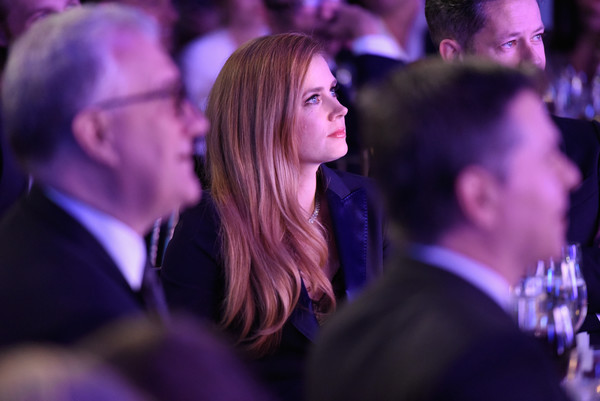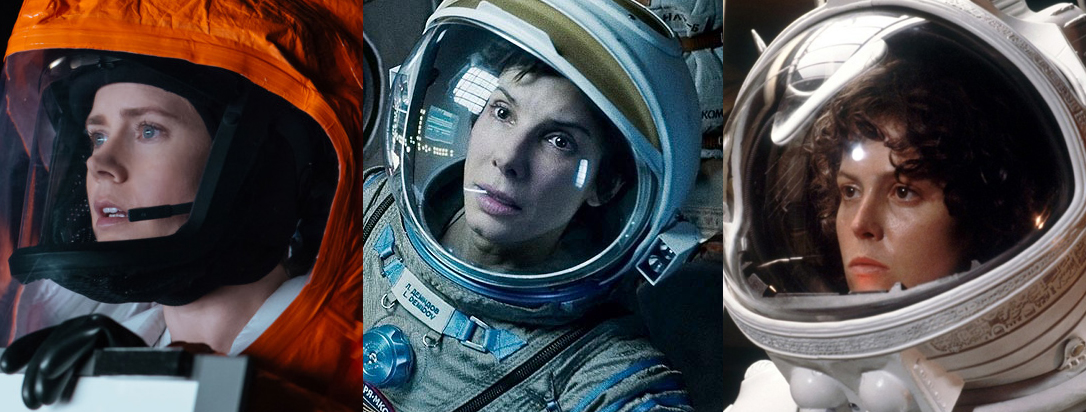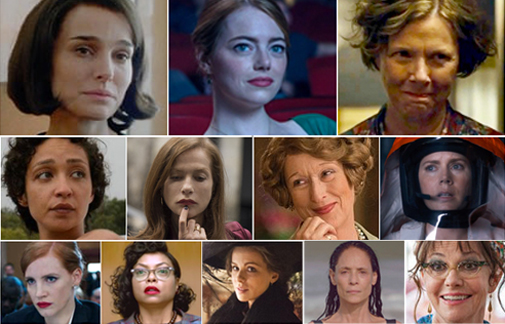The news of Amy Adams winning the NBR delighted many and also stirred up the usual "The Film Experience hates her!" complaints in the commentary. We do not. Being frustrated by an actor's ubiquity and dullness at one particular annual event is not the same as hating them or their work. Amy Adams is a very fine actress. She has given many delightful performances, two of which would have even made non-controversial Oscar wins had she managed to actually nab the statue (Junebug or The Fighter).
 Amy Adams (5), Albert Finney (5), and Glenn Close (6) are the living actors with the most Oscar nominations who have never won.
Amy Adams (5), Albert Finney (5), and Glenn Close (6) are the living actors with the most Oscar nominations who have never won.
And it's true that she's quite amazing in Arrival, serving as the audience vessel to in two simultaneous and important ways that the movie couldn't succeed without: she's awestruck by what she's watching (she's our eyes and surely our facial expressions in the dark); apart from that awe she's emotionally and intellectually engaged with the events in order to grapple with them and suss out meaning which is what the audience is always doing when they're watching grand films that demands that they pay attention with both their heart and their mind.
But for all of that I don't think she's making the Oscar lineup and here's why...
 Arrival (2016), Gravity (2013), Aliens (1986)
Arrival (2016), Gravity (2013), Aliens (1986)
The first and most obvious reason is that Arrival is a science fiction film and actors don't get nominated for those. Oh sure there are exceptions as there are for any rule but they are very few. We've only seen two inarguable instances of Best Actress nominations from sci-fi films: Sigourney Weaver in Aliens (1986) and Sandra Bullock in Gravity (2013)... three if you count Kate Winslet in Eternal Sunshine but let's not since people never think of that as a sci-fi film even if they maybe should and perception is reality when it comes to genre. For reasons we will never quite understand, the actor's branch perceives genre acting to be lesser than acting in straight drama. This is baffling since acting within any type of movie has its own unique challenges -- it's the skill that you bring to them and the stories you tell with them and the character arcs you explore and which genre you're working in shouldn't matter at all.
The second but perhaps less obvious reason why Amy Adams has a more difficult task this year than she often does at winning nominations is that it's a highly competitive year in the Lead Actress category. In both previous cases, 1986 and 2013, it was not. Let's look back at those years.
 Close but no cigar? The 2013 Best Actress shut-outs
Close but no cigar? The 2013 Best Actress shut-outs
2013 When Sandra Bullock was nominated for Gravity that film was clearly a threat to the eventual winner 12 Years a Slave and it won the most Oscars in the end. It was also a box office sensation, the sixth most popular movie of its year. Very strong and publicly beloved Best Picture contenders tend to effect voting in all branches, including the actors branch (see also, say, Alec Guiness's nomination for Star Wars). I don't think anyone would argue that Arrival is a serious threat to win Best Picture (like Gravity was) even if they would argue that it deserves to. Meanwhile in the Best Actress race of 2013 there was always a very clear frontrunner (Cate Blanchett in Blue Jasmine) and the other women were just hoping to get nominated. Five women were totally in the hunt for the other four slots and Emma Thompson (Saving Mr Banks) proved the odd woman out come nomination morning. The other women milling about the awards race --- people like Brie Larson (Short Term 12), Julia Louis-Dreyfus (Enough Said) and Greta Gerwig (Frances Ha) were all in small indies that Oscar didn't notice in any categories. In short, Bullock was never in danger of losing that nomination.
 The 1986 crop didn't excite the Academy
The 1986 crop didn't excite the Academy
1986 Aliens, like Gravity was a top ten of the year box office sensation and critical hit when Sigourney Weaver was nominated for Best Actress. (For comparisons sake Arrival is currently the 43rd highest grossing film of 2016.) And the 1986 Best Actress race was even emptier than its 2013 counterpart. There was no juggernaut leader (ala Blanchett) with Kathleen Turner (Peggy Sue Got Married) and Marlee Matlin (Children of a Lesser God) in a showdown for the win. To illustrate how atypical the Oscar race was only TWO of the Golden Globe nominees from each of their categories (Drama and Comedy) made the Oscar list. The other women* mulling about were in movies that were either exceptionally dour, flops, curiousities that people didn't really like or comedies they didn't take seriously (Night Mother, Duet For One, That's Life, Extremities, Down and Out in Beverly Hills, Something Wild -- between those six pictures, one Oscar nomination in total... for Best Song).
Sigourney Weaver was no sure thing given Oscar's anti-sci-fi bias but it was also not a race with particularly strong enthusiasms for her competition and she definitely had the enthusiasm with that "wow" star turn. Into that Best Actress void at the last minute sprang Jane Fonda in another atypical genre vehicle (a thriller) The Morning After. It opened on Christmas and people didn't see it coming as an awards player. Both Sigourney and Jane were nominated...and probably with ease, too.
 Is this tiered structure how you see the current race for Best Actress nominations?
Is this tiered structure how you see the current race for Best Actress nominations?
2016 By contrast this year already has five respected and well liked Best Actress ready performances that fall under the realm of typical Oscar appeal (alpha order: Bening, Negga, Portman, Stone, and Streep) and one career honors type of movement for a legend in an atypical vehicle in which everyone agrees she's spectacular (Huppert) and possibly a little interference from a due performer who some voters might think of as lead rather than the "supporting" status they're claiming (Davis). How does Adams get past that significant firewall of strong contenders for a sixth nomination for an Oscar no one really thinks she could actually win?
P.S. The NBR doesn't have any discernible pattern with Best Actress - In the past 10 years worth of Best Actress prizes from the NBR, 3 went on to win the Oscar, another 4 were nominated and 3 were passed over by Oscar. That's typical of their whole history dating back to the 1940s.